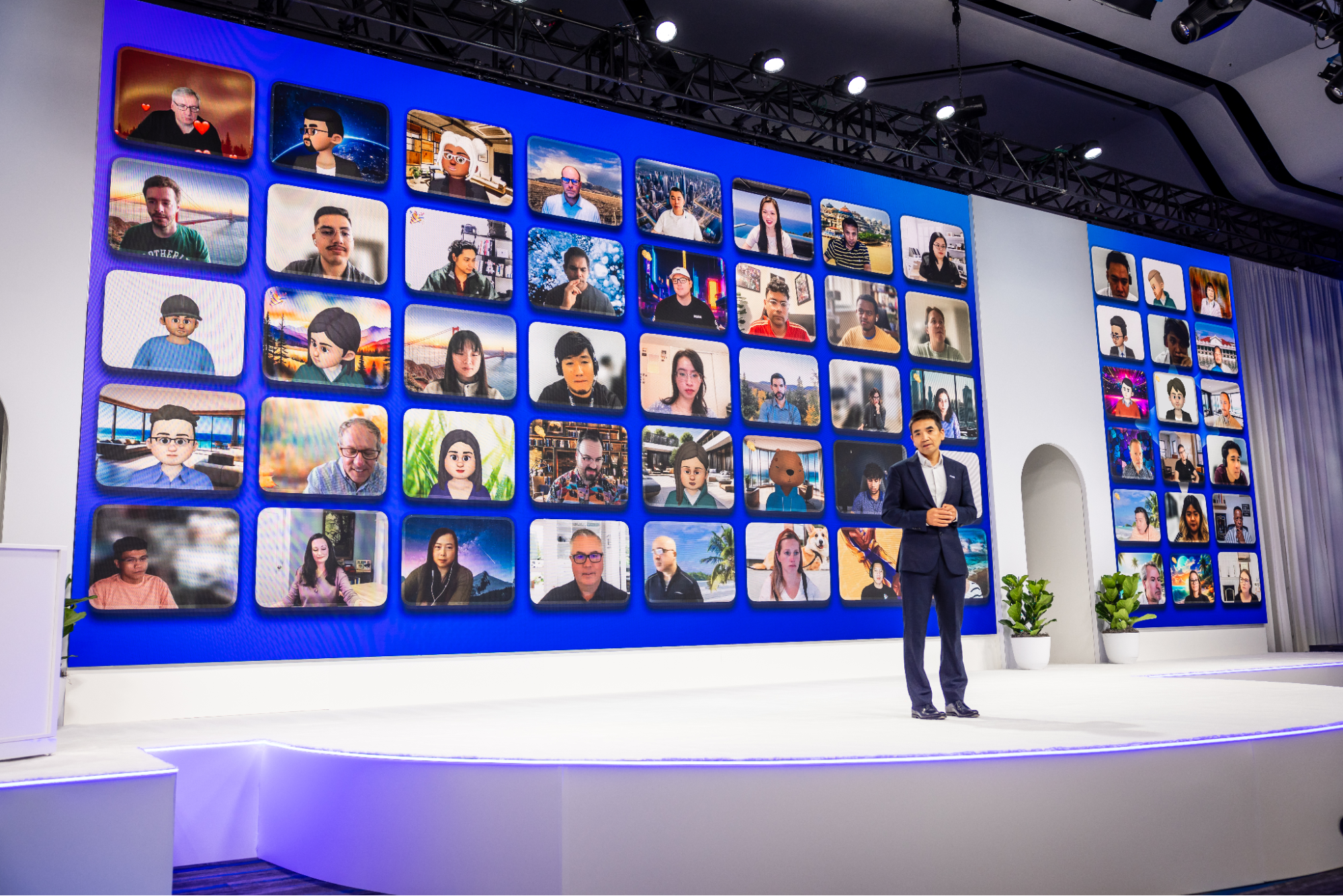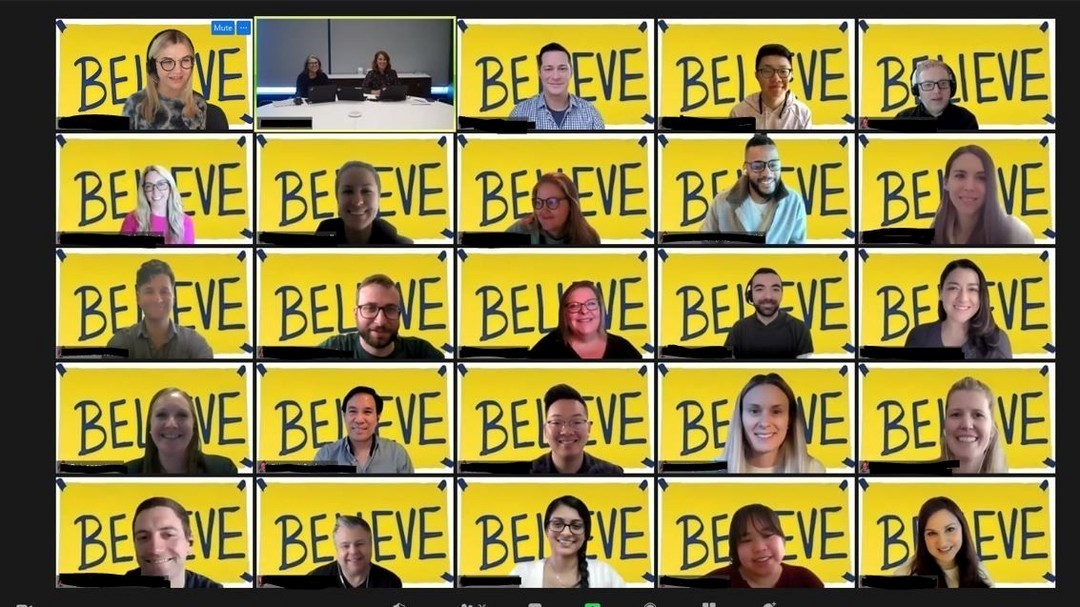
Bridge the best of both worlds in your next hybrid event
Tiles for Zoom is a ready-to-use way to beautifully display virtual audiences in a hybrid-first world.
Updated on September 23, 2022
Published on July 27, 2022


In-person events may be returning, but the demand for virtual and hybrid experiences remains strong. Not only are they cost-effective and beneficial for remote audiences, but they allow event marketers to extend their brand reach far beyond the four walls of a traditional conference space.
You may be thinking, “Sign me up!” But if you’re new to hybrid events and not sure where to start, keep reading for some expert advice to help you build your own playbook. We asked Savannah Fairbank, a seasoned virtual events manager at global law firm, Cooley LLP to share some insight from her personal experience hosting hybrid events and tips to keep your audiences engaged.
Cooley is typically involved in 900+ events per year, which includes sponsorships, speaking engagements, educational meetings, and conferences. We were familiar with virtual events before COVID-19 and used Zoom Webinars and Zoom Meetings to distribute educational content for clients. But in 2020, we went headfirst into solely offering virtual programming and pivoted our entire event offering to be virtual.
We wanted to offer an event experience that had a virtual component that would be comparable in some capacity to our on-the-ground events. So, we used Zoom Events and partnered with The Berkeley Center for Law and Business to host a two-day hybrid conference known as the Berkeley Forum on Corporate Governance. That was our first foray into hybrid events, and in addition to planning it virtually, we also planned and executed the live event on the ground.
The virtual option allows us to be as inclusive as possible. For the Berkeley event, our attendees were, for the most part, local. Because we were offering a virtual component as well as in-person, both Cooley and Berkeley were able to send event invitations out to a much larger invite list. There's really no comparison to adding in that virtual component because it's going to triple the number of people who end up attending the event overall.
I want to take the feeling or the energy of an in-person event and translate that in some capacity, virtually. If I've got an audience of 100 people in a room and they're able to ask a panel questions, but I've got a virtual audience that cannot, I’ve got to find a way to allow the virtual audience to interact with an on-the-ground speaker that feels seamless and natural. We don't want them rolling their eyes because a screen is not working while we're trying to get a question through.
I'm always concerned about the people who are not good at technology; making sure that everyone knows how to get logged on or they know how to utilize what they're looking at. When building an event, I think about how I can ensure someone who is extremely uncomfortable with technology is able to participate comfortably. Because we use Zoom technology in all our Cooley offices, we frequently receive positive feedback that Zoom is very easy to use from a speaker and attendee perspective. For our hybrid event, we got quite a bit of positive feedback that Zoom Events was easy to navigate and felt seamless, even to those who are iffy about technology.
The AV component is so critical because at the end of the day if it doesn't work, it doesn't matter how much we planned. The audience on the ground needs to look at the exact same video feed that is going into the virtual event, not some kind of strange amalgamation of what is happening live.
At our hybrid event, the Cooley events team was executing on the ground, making sure the live event was successful. Since we couldn’t be online and offline at the same time, we used Zoom’s Events Services team to execute the virtual piece in terms of starting and stopping the sessions and helping to build it out on the back end.
We're always thinking about how our brand is represented and expressed. For in-person events, I know what branding we’re going to have and what our options are. I know what the stage looks like, the agenda, the lighting. For our hybrid event, Zoom Events allowed us to mimic the on-the-ground branding as much as possible. A big piece was conceptualizing how to make our virtual event feel like Cooley but through Zoom, because Cooley uses Zoom and our offices are integrated with Zoom Rooms.
I think the most natural and obvious way for live speakers to engage with their audience is to talk to the people in front of you. But keep in mind there are two separate audiences to speak to. There are another 600 people watching you on the internet. Try to play to them a little bit more and be aware of where the camera is when you welcome people or refer to attendees.
Also, consider the event from both an attendee and a speaker perspective. If a speaker isn’t fully comfortable with the technology they’re using, it’s going to come through in their presentation. Be sure to have dress rehearsals and walk-throughs so the speakers know what's going to happen and they feel comfortable speaking virtually.
It's certainly something that we always discuss now whereas before it wasn't necessarily considered unless we had a solid reason to bring in a virtual component. Now, it is always on the table, and 80% of the time, the answer is yes, we are going to offer something virtually.
To learn how the Zoom platform helps Cooley carry on its reputation as a technology disruptor, read the full story here. If you’re interested in hosting a virtual or hybrid event with Zoom Events, contact us for a 1:1 demo of our virtual events platform.